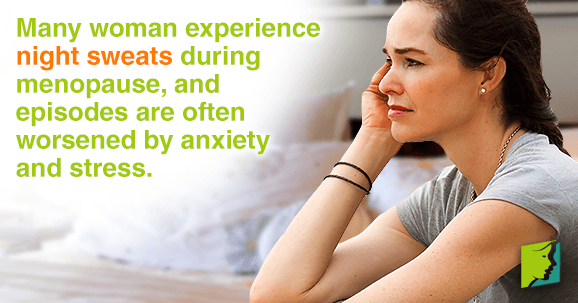Night sweats are severe sweating episodes that occur while you're asleep. Usually, a sudden feeling of heat spreads across the body, skin becomes red, and heart palpitations occur. Night sweats can cause sleeping problems and wet night clothes and bed linen can cause chills.
What Causes Night Sweats?
In a study of 2,267 patients (both men and women), 41% of people said they suffered from night sweats the previous month. For women, hormonal changes during menopause are one of the main causes of night sweats.
Many woman experience night sweats during menopause, and episodes are often worsened by anxiety and stress. Even so, anxiety and stress-caused night sweats are not usually prolonged and may only occur over a short period of time, usually the first year of postmenopause.
What Is the Relationship between Night Sweats and Anxiety, Stress, and Fatigue?
When estrogen levels begin to fall in menopause, the hypothalamus (the body's temperature regulator) can malfunction. Night sweats happen when the body can't tell what temperature it is, and heats itself up suddenly. When it realizes its mistake, it tries to cool down by sweating profusely.
Anxiety, stress, and fatigue can worsen night sweats. The extra stress can cause the release of stress hormones, which can amplify already existing hormonal imbalances in the body. This can worsen or increase the amount of night sweats.
How Can I Prevent Night Sweats?
Anxiety and stress-caused night sweats in menopausal women are usually triggered by changing levels of estrogen. This hormonal fluctuation can sometimes be improved or worsened by certain lifestyle choices.
Some easy tips for balancing hormone levels a little better:
- Eat a healthy, balanced diet that includes red meat, fruit, vegetables, dairy products, and fiber
- Don't sleep in a hot environment and keep the bedroom cool
- Wear loose-fitting cotton or non-synthetic pajamas that allow the skin to breathe
- Drink plenty of water daily and keep a bottle of water next to the bed
- Avoid drinking too much alcohol or coffee
- Try and lessen how much you smoke
- Exercise regularly
- Try to do something to relax your mind for 20 minutes before bed. A relaxing bath, reading a book, taking a walk, meditation, etc.
Recommendations
If a lifestyle changes don't help decrease night sweats, there are other options. Many medications and herbal supplements are available for treating menopause symptoms. Click here to read about the different treatments for night sweats.
Sources
- The National Institute of Health. "Signs of the Menopausal Transition" www.nih.gov
- Boston Women's Health Collective. "Hot Flashes, Night Sweats and Sleep Disturbances". Our Bodies, Ourselves, 2006.
- Von Muhlen, DG, et al. "A community-based study of menopause symptoms and estrogen replacement in older women". Maturitas. Sept 1995; 22(2):71-8.



